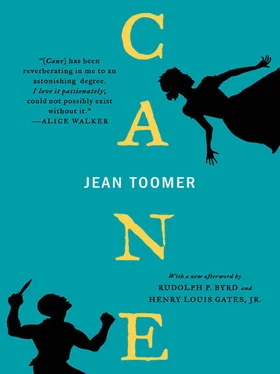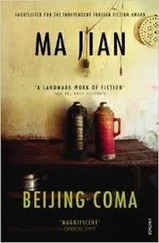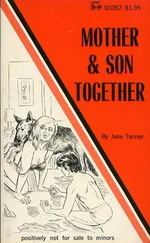“Tom Burwell….”
White men like ants upon a forage rushed about. Except for the taut hum of their moving, all was silent. Shotguns, revolvers, rope, kerosene, torches. Two high-powered cars with glaring searchlights. They came together. The taut hum rose to a low roar. Then nothing could be heard but the flop of their feet in the thick dust of the road. The moving body of their silence preceded them over the crest of the hill into factory town. It flattened the Negroes beneath it. It rolled to the wall of the factory, where it stopped. Tom knew that they were coming. He couldnt move. And then he saw the search-lights of the two cars glaring down on him. A quick shock went through him. He stiffened. He started to run. A yell went up from the mob. Tom wheeled about and faced them. They poured down on him. They swarmed. A large man with dead-white face and flabby cheeks came to him and almost jabbed a gun-barrel through his guts.
“Hands behind y, nigger.”
Tom’s wrists were bound. The big man shoved him to the well. Burn him over it, and when the woodwork caved in, his body would drop to the bottom. Two deaths for a godam nigger. Louisa was driven back. The mob pushed in. Its pressure, its momentum was too great. Drag him to the factory. Wood and stakes already there. Tom moved in the direction indicated. But they had to drag him. They reached the great door. Too many to get in there. The mob divided and flowed around the walls to either side. The big man shoved him through the door. The mob pressed in from the sides. Taut humming. No words. A stake was sunk into the ground. Rotting floor boards piled around it. Kerosene poured on the rotting floor boards. Tom bound to the stake. His breast was bare. Nails’ scratches let little lines of blood trickle down and mat into the hair. His face, his eyes were set and stony. Except for irregular breathing, one would have thought him already dead. Torches were flung onto the pile. A great flare muffled in black smoke shot upward. The mob yelled. The mob was silent. Now Tom could be seen within the flames. Only his head, erect, lean, like a blackened stone. Stench of burning flesh soaked the air. Tom’s eyes popped. His head settled downward. The mob yelled. Its yell echoed against the skeleton stone walls and sounded like a hundred yells. Like a hundred mobs yelling. Its yell thudded against the thick front wall and fell back. Ghost of a yell slipped through the flames and out the great door of the factory. It fluttered like a dying thing down the single street of factory town. Louisa, upon the step before her home, did not hear it, but her eyes opened slowly. They saw the full moon glowing in the great door. The full moon, an evil thing, an omen, soft showering the homes of folks she knew. Where were they, these people? She’d sing, and perhaps they’d come out and join her. Perhaps Tom Burwell would come. At any rate, the full moon in the great door was an omen which she must sing to:
Red nigger moon. Sinner!
Blood-burning moon. Sinner!
Come out that fact’ry door.
Money burns the pocket, pocket hurts,
Bootleggers in silken shirts,
Ballooned, zooming Cadillacs,
Whizzing, whizzing down the street-car tracks.
Seventh Street is a bastard of Prohibition and the War. A crude-boned, soft-skinned wedge of nigger life breathing its loafer air, jazz songs and love, thrusting unconscious rhythms, black reddish blood into the white and whitewashed wood of Washington. Stale soggy wood of Washington. Wedges rust in soggy wood…Split it! In two! Again! Shred it!..the sun. Wedges are brilliant in the sun; ribbons of wet wood dry and blow away. Black reddish blood. Pouring for crude-boned soft-skinned life, who set you flowing? Blood suckers of the War would spin in a frenzy of dizziness if they drank your blood. Prohibition would put a stop to it. Who set you flowing? White and whitewash disappear in blood. Who set you flowing? Flowing down the smooth asphalt of Seventh Street, in shanties, brick office buildings, theaters, drug stores, restaurants, and cabarets? Eddying on the corners? Swirling like a blood-red smoke up where the buzzards fly in heaven? God would not dare to suck black red blood. A Nigger God! He would duck his head in shame and call for the Judgment Day. Who set you flowing?
Money burns the pocket, pocket hurts,
Bootleggers in silken shirts,
Ballooned, zooming Cadillacs,
Whizzing, whizzing down the street-car tracks.
Rhobert wears a house, like a monstrous diver’s helmet, on his head. His legs are banty-bowed and shaky because as a child he had rickets. He is way down. Rods of the house like antennae of a dead thing, stuffed, prop up in the air. He is way down. He is sinking. His house is a dead thing that weights him down. He is sinking as a diver would sink in mud should the water be drawn off. Life is a murky, wiggling, microscopic water that compresses him. Compresses his helmet and would crush it the minute that he pulled his head out. He has to keep it in. Life is water that is being drawn off.
Brother, life is water that is being drawn off.
Brother, life is water that is being drawn off.
The dead house is stuffed. The stuffing is alive. It is sinful to draw one’s head out of live stuffing in a dead house. The propped-up antennæ would cave in and the stuffing be strewn…shredded life-pulp…in the water. It is sinful to have one’s own head crushed. Rhobert is an upright man whose legs are banty-bowed and shaky because as a child he had rickets. The earth is round. Heaven is a sphere that surrounds it. Sink where you will. God is a Red Cross man with a dredge and a respiration-pump who’s waiting for you at the opposite periphery. God built the house. He blew His breath into its stuffing. It is good to die obeying Him who can do these things.
A futile something like the dead house wraps the live stuffing of the question: how long before the water will be drawn off? Rhobert does not care. Like most men who wear monstrous helmets, the pressure it exerts is enough to convince him of its practical infinity. And he cares not two straws as to whether or not he will ever see his wife and children again. Many a time he’s seen them drown in his dreams and has kicked about joyously in the mud for days after. One thing about him goes straight to the heart. He has an Adam’s-apple which strains sometimes as if he were painfully gulping great globules of air…air floating shredded life-pulp. It is a sad thing to see a banty-bowed, shaky, ricket-legged man straining the raw insides of his throat against smooth air. Holding furtive thoughts about the glory of pulp-heads strewn in water…He is way down. Down. Mud, coming to his banty knees, almost hides them. Soon people will be looking at him and calling him a strong man. No doubt he is for one who has had rickets. Lets give it to him. Lets call him great when the water shall have been all drawn off. Lets build a monument and set it in the ooze where he goes down. A monument of hewn oak, carved in nigger-heads. Lets open our throats, brother, and sing “Deep River” when he goes down.
Brother, Rhobert is sinking.
Lets open our throats, brother,
Lets sing Deep River when he goes down.
For a long while she was nothing more to me than one of those skirted beings whom boys at a certain age disdain to play with. Just how I came to love her, timidly, and with secret blushes, I do not know. But that I did was brought home to me one night, the first night that Ned wore his long pants. Us fellers were seated on the curb before an apartment house where she had gone in. The young trees had not outgrown their boxes then. V Street was lined with them. When our legs grew cramped and stiff from the cold of the stone, we’d stand around a box and whittle it. I like to think now that there was a hidden purpose in the way we hacked them with our knives. I like to feel that something deep in me responded to the trees, the young trees that whinnied like colts impatient to be let free…On the particular night I have in mind, we were waiting for the top-floor light to go out. We wanted to see Avey leave the flat. This night she stayed longer than usual and gave us a chance to complete the plans of how we were going to stone and beat that feller on the top floor out of town. Ned especially had it in for him. He was about to throw a brick up at the window when at last the room went dark. Some minutes passed. Then Avey, as unconcerned as if she had been paying an old-maid aunt a visit, came out. I dont remember what she had on, and all that sort of thing. But I do know that I turned hot as bare pavements in the summertime at Ned’s boast: “Hell, bet I could get her too if you little niggers weren’t always spying and crabbing everything.” I didnt say a word to him. It wasnt my way then. I just stood there like the others, and something like a fuse burned up inside of me. She never noticed us, but swung along lazy and easy as anything. We sauntered to the corner and watched her till her door banged to. Ned repeated what he’d said. I didnt seem to care. Sitting around old Mush-Head’s bread box, the discussion began. “Hang if I can see how she gets away with it,” Doc started. Ned knew, of course. There was nothing he didnt know when it came to women. He dilated on the emotional needs of girls. Said they werent much different from men in that respect. And concluded with the solemn avowal: “It does em good.” None of us liked Ned much. We all talked dirt; but it was the way he said it. And then too, a couple of the fellers had sisters and had caught Ned playing with them. But there was no disputing the superiority of his smutty wisdom. Bubs Sanborn, whose mother was friendly with Avey’s, had overheard the old ladies talking. “Avey’s mother’s ont her,” he said. We thought that only natural and began to guess at what would happen. Some one said she’d marry that feller on the top floor. Ned called that a lie because Avey was going to marry nobody but him. We had our doubts about that, but we did agree that she’d soon leave school and marry some one. The gang broke up, and I went home, picturing myself as married.
Читать дальше











